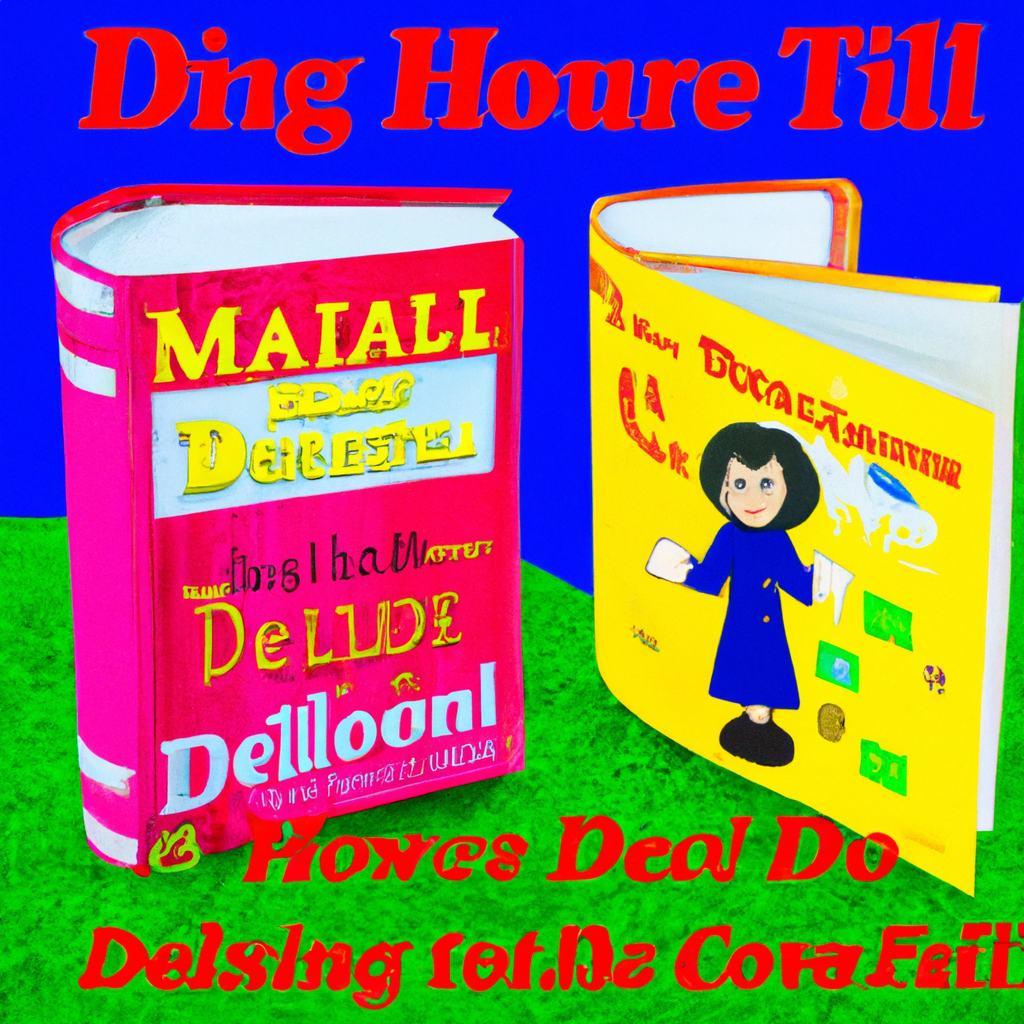
I. Introduction
In today’s fast-paced and stressful world, people are constantly seeking ways to improve themselves and their lives. One way to achieve personal growth and development is through reading self-help books. Self-help books are books that provide guidance, advice and strategies on how to improve oneself and one’s life.
Self-help books are popular because they offer practical solutions to common problems, such as stress, anxiety, and unfulfilling relationships. They allow individuals to learn at their own pace, and in the privacy of their own environment. Additionally, self-help books are often less expensive than traditional forms of self-improvement, such as therapy sessions.
Self-help books have a long history, dating back to the early 19th century with the publication of books such as Samuel Smiles’ Self-Help, which focused on the development of character and self-reliance. However, it was not until the 20th century that the genre really took off with the publication of Dale Carnegie’s classic How to Win Friends and Influence People. Since then, the self-help genre has exploded, with thousands of books published each year on a wide range of topics.
The importance of self-help books for personal growth and development cannot be overstated. Self-help books provide individuals with the tools and strategies they need to achieve their goals, whether in their personal or professional lives. They help individuals to gain a better understanding of themselves, their strengths and weaknesses, and how to improve on them.
In the following sections, we will explore the different formats of self-help books, including psychology and mental health books, business and leadership books, lifestyle and relationship books, and spiritual and mindfulness books. We will also discuss some of the best self-help books for personal growth and development, as well as how to choose the right books for your needs. Finally, we will offer tips for effective reading and implementation of self-help books, as well as potential pitfalls to avoid.

II. Popular Self-Help Formats
Self-help books come in various formats with different topics, each focusing on personal growth and development. The following are popular self-help formats categorized by their related themes:
– Psychology and Mental Health Books
Psychology and mental health books provide readers with the knowledge and tools to understand the human psyche and how to address mental health problems. Popular books in this category include “Feeling Good: The New Mood Therapy” by David D. Burns, “The Power of Vulnerability: Teachings of Authenticity, Connection, and Courage” by Brene Brown, and “Attached: The New Science of Adult Attachment and How It Can Help You Find – and Keep – Love” by Amir Levine and Rachel Heller. These books delve into topics such as anxiety, depression, self-esteem, communication, and relationships.
– Business and Leadership Books
Business and leadership books provide insights and practical methods for improving one’s career, business, and leadership skills. Popular titles in this category include “Good to Great” by Jim Collins, “The Lean Startup” by Eric Ries, and “The 21 Irrefutable Laws of Leadership” by John C. Maxwell. These books touch on topics such as entrepreneurship, management styles, time management, and personal branding.
– Lifestyle and Relationship Books
Lifestyle and relationship books offer strategies for improving one’s personal and social life. Popular titles in this category include “The Life-Changing Magic of Tidying Up” by Marie Kondo, “The 5 Love Languages: The Secret to Love That Lasts” by Gary Chapman, and “The Power of Habit: Why We Do What We Do in Life and Business” by Charles Duhigg. These books discuss topics like organizing, relationships, communication, and self-improvement.
– Spiritual and Mindfulness Books
Spiritual and mindfulness books address the mind, body, and soul. Popular books in this category include “The Power of Now” by Eckhart Tolle, “The Celestine Prophecy” by James Redfield, and “The Four Agreements: A Practical Guide to Personal Freedom (A Toltec Wisdom Book)” by Don Miguel Ruiz. These books deal with topics like meditation, spiritual awakening, and self-discovery.
In summary, self-help books offer readers practical solutions to improve their personal growth and development. Whether you’re looking to improve your mental health, business acumen, personal lifestyle, or spiritual well-being, there is a variety of self-help books available. It’s essential to explore different formats and find the ones that resonate with you and your goals.
III. Best Self-Help Books for Personal Growth and Development
Self-help books come in a variety of formats, from psychology and mental health books to business and leadership books. Here are some of the most popular and influential self-help books for personal growth and development:
1. The 7 Habits of Highly Effective People by Stephen Covey: First published in 1989, this classic self-help book provides a framework for personal and professional success based on seven habits. Covey’s book emphasizes the importance of proactive behavior and personal responsibility in achieving goals.
2. The Power of Now by Eckhart Tolle: This book encourages readers to live in the present moment by detaching from negative thoughts and emotions. Tolle emphasizes the importance of inner peace and mindfulness in achieving happiness and fulfillment.
3. Think and Grow Rich by Napoleon Hill: Originally published in 1937, this book has been a perennial bestseller and a favorite of entrepreneurs and success-seekers. Hill’s book explores the mindset and habits of successful people and emphasizes the power of positive thinking and self-discipline.
4. The Alchemist by Paulo Coelho: This allegorical novel follows the journey of a young shepherd named Santiago as he seeks his personal legend. Coelho’s book encourages readers to pursue their dreams and trust in their own intuition.
5. Awaken the Giant Within by Tony Robbins: Robbins is one of the most well-known self-help gurus, and this book is one of his most popular. Awaken the Giant Within teaches readers how to eliminate negative self-talk, set powerful goals and take consistent action to achieve their desired outcomes.
6. Becoming by Michelle Obama: In this memoir, Michelle Obama shares her personal journey from a working-class family to becoming the first African American First Lady of the United States. Obama’s book is an inspiring story of resilience, self-discovery, and personal growth.
7. Atomic Habits by James Clear: This book explains how small changes in habits and behaviors can lead to significant improvements in personal and professional life. Clear provides practical strategies for building habits that last and creating positive change.
In summary, these self-help books provide different approaches and insights for individuals seeking personal and professional growth. Whether you aspire to be a successful entrepreneur, want to improve your mental health and well-being, or simply want to live a more fulfilling life, there are inspirational and practical messages within each of these books that can help readers reach their goals.
IV. How to Choose Self-Help Books for Personal Growth and Development
Choosing the right self-help book for personal growth and development can be overwhelming due to the variety of books available in the market. However, by considering certain factors, it is possible to find the perfect book for one’s personal goals and objectives.
The first step in choosing a self-help book is to determine one’s personal goals and needs. Are you looking to improve your mental health or achieve greater success in your career? Are you hoping to improve your relationships or find inner peace and happiness? Identifying what you hope to gain from a self-help book will make it easier to narrow down your options and find a book that meets your specific needs.
Reading reviews by other readers and experts is also a useful way to evaluate self-help books. Websites like Goodreads and Amazon offer book reviews and ratings from readers which can help to identify popular books on the topic. Experts such as life coaches, therapists, or psychologists often have recommendations for the best self-help books for personal development in their field of expertise. Reading reviews allows you to gain a better understanding of the book’s contents and its effectiveness in achieving its intended outcomes.
Consulting with professionals or trusted individuals is another way to find the right self-help book. Professionals like a therapist, life coach, or counselor can provide specific book recommendations based on your personal goals and needs. They may even prescribe certain books as part of your therapy plans. Friends, family, and colleagues who have found success in achieving personal growth and development through self-help books can also provide valuable recommendations.
It is important to avoid gimmicky or overly simplistic books that offer quick fixes or instant gratification. Such books may provide temporary relief but are unlikely to offer long term change or growth. Look for books that offer practical and realistic techniques, evidence-based research, and an authentic and honest approach to personal growth.
In summary, selecting a self-help book for personal growth and development takes consideration, research, and evaluation. By understanding one’s personal goals and needs and reading reviews and recommendations from others, the right self-help book can be found. It’s important to avoid books that promise quick fixes and instead focus on books that offer practical and realistic techniques to achieve personal growth and development.
V. Tips for Effective Reading and Implementation of Self-Help Books
Self-help books can be powerful tools for personal growth and development. However, reading them is not enough to bring about change in one’s life. It is also essential to implement the concepts and ideas presented in these books. In this section, we will discuss five tips for effective reading and implementation of self-help books.
1. Set clear intentions before reading
Before diving into a self-help book, it is crucial to understand why you are reading it and what you hope to gain from it. Setting clear intentions can help you stay focused and motivated as you work through the book. Ask yourself, “What do I want to achieve by reading this book?” Your intentions might be to learn a new skill, overcome a particular challenge, or gain a deeper understanding of yourself.
2. Take notes and highlight important points
As you read, take notes on the ideas that resonate with you the most. Highlighting key points can also help you remember the most important concepts. You can use a journal or notebook to write down your thoughts, questions, and insights. Not only does this help reinforce your understanding of the book’s content, but it also creates a record that you can refer to later.
3. Identify actionable steps
After reading a self-help book, it is essential to identify actionable steps that you can take to apply the ideas presented in the book to your life. It might be helpful to create a to-do list or action plan based on the book’s content. By breaking down the ideas into smaller, manageable steps, you will be more likely to implement them successfully.
4. Incorporate new habits and concepts into your daily routine
Changing habits and behaviors is a gradual process that requires consistency and practice. When implementing the ideas from a self-help book, it is essential to incorporate them into your daily routine consistently. For example, if you decide to start a daily meditation practice, set aside time each day to meditate. By incorporating new habits into your routine, you are more likely to make them a permanent part of your life.
5. Reflect on progress regularly
Finally, it is crucial to reflect on your progress regularly. Set aside time each week or month to review the actionable steps you have taken and assess your progress. Ask yourself, “What have I done well? Where have I struggled?” This reflection can help you make course corrections or adjust your approach to improve your results.
In conclusion, reading self-help books is only the first step towards personal growth and development. To get the most out of these books, it is essential to implement the concepts and ideas presented in them. By following the tips outlined in this section, you can maximize the benefits of self-help books and bring about meaningful change in your life.
VI. The Potential Pitfalls of Self-Help Books
Self-help books are excellent resources for personal growth and development, but they are not without pitfalls. While the benefits of reading self-help books are numerous, relying too much on them can also have negative consequences. In this section, we will examine some of the potential pitfalls of self-help books and strategies to avoid them.
1. Over-reliance on books for personal growth
One of the most significant pitfalls of relying too heavily on self-help books is that they can replace personal experience and professional guidance. While books can be helpful in providing insight and inspiration, they cannot replace the value of real-life experience and mentorship. Furthermore, relying too much on self-help books can lead to feelings of inadequacy or failure. Reading countless motivational books without taking meaningful action can create a false sense of progress or achievement that ultimately leads to disappointment.
To avoid over-reliance on books, it is crucial to prioritize personal growth through practical experiences and mentorship. Readers should aim to implement the advice learned from books in their daily lives, and seek out professional guidance when necessary. Additionally, taking the time to reflect on the progress made can help to reinforce the lessons learned from self-help books.
2. Inaccurate or harmful advice
Another potential pitfall of self-help books is that some of the advice provided may not be accurate or may be harmful. Self-help books are often not peer-reviewed or subject to rigorous fact-checking, leading to instances of misinformation. Moreover, some authors may provide advice that is not scientifically based, and readers may not have the necessary tools to evaluate the validity of that advice.
To avoid inaccurate or harmful advice, it is essential to evaluate the sources of information used by the authors of self-help books. Readers should look for books written by authors with relevant qualifications and expertise in the subject matter. Additionally, it is advisable to seek professional advice when encountering unfamiliar or challenging topics.
3. Lack of accountability or follow-through
A pitfall that many readers encounter is that they do not follow through on reading the books or implementing the lessons learned. In some cases, reading self-help books can be an easy way to procrastinate or avoid taking meaningful action towards personal growth and development.
To avoid lack of accountability or follow-through, readers should set realistic goals for reading self-help books and implementing the lessons learned. Additionally, readers should hold themselves accountable for the results, keeping track of their progress and reflecting on their efforts regularly.
In conclusion, self-help books are excellent resources for personal growth and development, but they should be approached with caution. Over-reliance on books, inaccurate or harmful advice, and lack of accountability or follow-through are potential pitfalls that readers may encounter. By adopting strategies to avoid these pitfalls, readers can benefit from the valuable lessons provided by self-help books.
VII. Conclusion
Self-help books have long been a popular tool for personal growth and development. Through the years, they have helped countless individuals in various aspects of their lives. In this ultimate guide to self-help books, we have explored popular self-help formats, the best self-help books for personal growth and development, how to choose the right self-help books, tips for effective reading and implementation, and potential pitfalls of excessive reliance on self-help books.
The benefits of reading and implementing the concepts in self-help books are numerous. Firstly, self-help books often provide insights and perspectives that are not commonly offered in traditional sources of information. They contain valuable practical knowledge that can help individuals navigate their personal and professional lives with greater ease and success. Secondly, self-help books encourage introspection and self-reflection, which are important components of personal growth and development. They help individuals develop greater self-awareness and self-understanding, which in turn can lead to improved relationships, better mental health, and overall well-being.
While reading self-help books can provide numerous benefits, it is important to approach them with a critical eye. Not all self-help books are created equal, and some can even be harmful. It is important to choose books written by professionals, with evidence-based advice, and with good reviews from readers and experts.
Another potential pitfall of self-help books is relying too heavily on them for personal growth and development. While reading and learning from self-help books can be valuable, it is important to remember that real change comes from taking action and implementing what has been learned. It is essential to reflect regularly on the progress made, and to incorporate the new concepts and habits learned into daily life.
In conclusion, self-help books are powerful tools for personal growth and development. They can provide valuable insights and practical knowledge, encourage introspection, and help individuals develop greater self-awareness. By choosing the right books and implementing what has been learned, individuals can make positive changes in their personal and professional lives. Remember to approach self-help books with a critical eye, and to take action in order to achieve lasting personal growth and development.



